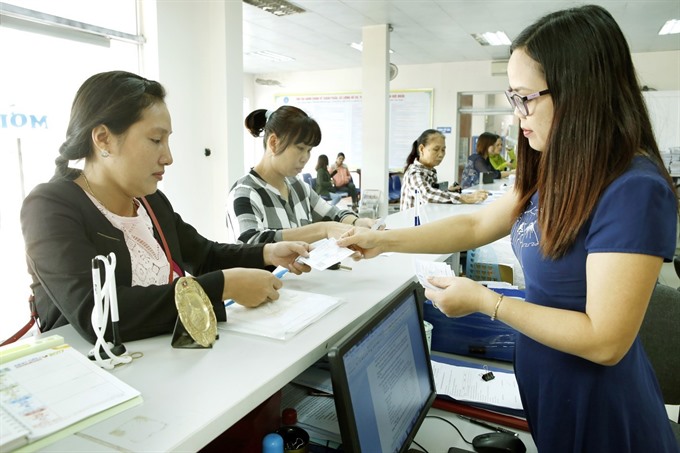 Society
Society

Việt Nam can and should extend social protection to those in the informal economy through a mix of contributory and non-contributory schemes in order to achieve universal coverage, experts said at a conference yesterday.
 |
| A worker of Phú Thọ Social Insurance Agency talks to a social-insurance user in northern Phú Thọ Province. — VNA/VNS Photo Dương Ngọc |
HÀ NỘI — Việt Nam can and should extend social protection to those in the informal economy through a mix of contributory and non-contributory schemes in order to achieve universal coverage, experts said at a conference on Wednesday.
They also agreed on the need for evidence-based social insurance reforms to meet the challenge of a rapidly aging population.
The conference on “Reforming social insurance policies – International experiences and recommendations for Việt Nam” was organised in Hà Nội by the Ministry of Labour, Invalids and Social Affairs (MoLISA) and the International Labour Organisation (ILO).
Conference participants also agreed that social insurance reforms should build on results already achieved.
Deputy Prime Minister Vương Đình Huệ said: “Social insurance is a key pillar of the social security system. It makes a great contribution to realising social advancement and justice with the view that access to social insurance is a universal right…”
He said “a proper roadmap” should be linked to the goal of universal coverage.
As a country with a fast aging population and a predominant informal economy, Việt Nam’s social insurance system faces several challenges, participants said.
Current coverage remains limited due to low compliance in the formal sector and low participation in the informal sector. Around 6-7 million senior citizens do not receive any pension at present, the conference heard.
The nation’s social insurance policies were not diverse or flexible enough to attract participants, and current procedures were also not convenient, speakers said.
“The challenge is how to reach ‘the missing middle,’ who fall between social insurance and social assistance coverage,” said ILO Việt Nam Director Chang-Hee Lee.
He said that extending coverage among small and medium enterprises, workers with short-term contracts and those without an employer-employee relationship requires additional effort and innovation.
It is important to extend social protection to workers in the informal economy as a way of formalising and improving their working conditions, he said.
The ILO recommended that Việt Nam extends social protection to those in the informal economy through a mix of contributory and non-contributory schemes in order to achieve universal coverage.
“The expansion of health insurance in Việt Nam shows that extending social insurance coverage is possible,” he added.
Pension crisis
Việt Nam’s pension fund is also facing a financial sustainability challenge in the near future.
High replacement rates (75 per cent maximally) and low retirement ages, a significant amount of members opting for lump-sum payouts, a high number of early retirement cases due to health issues and other factors including sectoral preferentials, are among the causes for the crisis.
“Parametric reforms towards a contributing-receiving balance in pension policies were addressed in the development of social insurance laws, most recently the revised Social Insurance Law in 2014,” Minister Huệ said.
“However, with the aging population and restructuring of the labour sector due to economic integration, climate change and industrial revolution 4.0, the pension fund faces the risk imbalance in the long run.”
The ILO has suggested Việt Nam undergo further parametric reforms, which could include increasing retirement age and reducing the replacement rate.
The head of ILO Việt Nam said the country should develop a multi-tier system for its social insurance scheme, taking inspiration from the positive experience acquired in health insurance.
“Fiscal space for extending social protection exists even in non-rich countries,” he added.
“The Government of Việt Nam could explore all possible financing options to promote the Sustainable Development Goals and national development through decent jobs and social protection.”
In Việt Nam, access to social protection is a citizen’s right enshrined in the country’s constitution.
Out of its population of about 95 million people, 14.6 million people are registered in social insurance schemes, accounting for about 30.4 per cent of the labour force.
About five million social insurance participants receive short-term insurance benefits (for sickness, work accidents, occupational diseases or maternal leave) yearly and about 150,000 people receive long-term benefits (pension after retirement pension and life insurance). Almost 3 million people receive a monthly pension. — VNS




